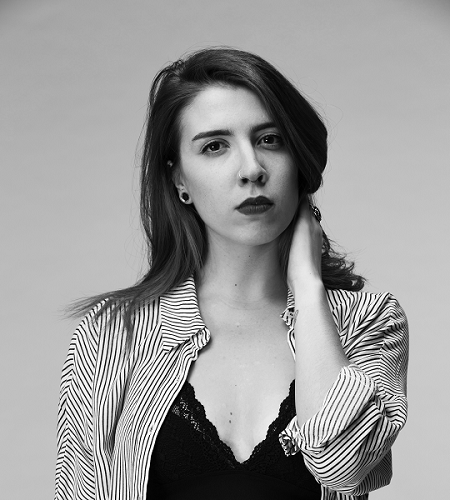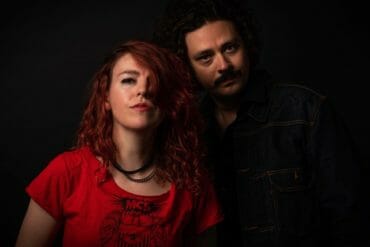In 2016, Beatrice Keeler, a creative writing student at Concordia University, surprised many by reaching the semifinals of “La Voix” (Québec’s version of “The Voice”) with a tremendous talent that impressed the judges (even though she wasn’t fluent in French). That talent shines through in her new album, “Bygone,” a collection of terrific songs that perfectly showcase her powerful and fluid voice.
The tracks on “Bygone” run the gamut from gentle folk to punk-flavored pop. One of my favorite tracks, “Anything That Wouldn’t Hurt,” features Keeler’s expressive voice paired with crunchy guitars and a terrific bass line, while “Je ne veux pas savoir” starts with a reflective guitar instrumental that offers a lovely and welcome respite in the album. “Youth,” co-written with Keeler’s “La Voix” coach Pierre Lapointe, is a gorgeous song that Keeler delivers with just the right touch of wistful reflection, without unwelcome pathos.
If this project is any indication, Beatrice Keeler has a terrific future ahead of her, and I look forward to hearing her work in the years to come.
We’re thrilled that Beatrice took the time to talk to us about her new album.
Per the title of your album, some of the material you chose is from early in your songwriting career. How did you approach choosing the songs that ultimately ended up on the album?
That definitely was one of the more difficult things to think about during the production process of the album because I had almost 10 years (5-7 that was actually “good”) worth of material to choose from. A lot of it was music I’d written in the last year or so, things I really enjoyed playing. Some like “Anything That Wouldn’t Hurt” and “Je ne veux pas savoir” I wrote specifically for the album. After that, there were some holes to fill that required me to dig a little deeper into my archives to see if anything had slipped through the cracks.
Beyond the obvious (gaining notoriety as a musician), how did your participation in “La Voix” impact you? And in particular, what did you take away from working from Pierre Lapointe?
It’s interesting for me to think of how to answer this question because when I look back on the person I was 2 years ago, she feels so far away. I have always struggled with stage fright, and I still do, but playing live in front of 2.5 million people (twice) tends to sort of snap you out of that, because you don’t really have the time to be stressed or afraid. I’ve definitely found ways to cope with that better now.
My experience working with Pierre was so wonderful. He always encouraged me to be exactly who I am, and basically to screw whoever didn’t like it. He made me feel ok about being different and pushing me to really connect with my punk roots (re: my performance of Nirvana and Creep). He was exactly what you would need from a mentor in a situation that was so foreign in almost every way.
Your bio mentions that you were part of some punk and alt-rock bands as a teenager; how does this album’s style (plenty of acoustic sounds, with some hints of punk and alt-rock mixed in) reflect where you are as a musician today?
After moving to Montreal 5 years ago, my band in Kingston disassembled and I didn’t really know any musicians in Montreal so I was forced to start writing music that I could play by myself. For so many years prior to that, I always wrote music with the intention of it being played in a band or heard by other people; I feel like this album sort of walks the line between a more intimate, gentler side of me (the side that before now, only my roommates, parents, and dog ever really got to see) and the stronger, more intrusive side of me that for the most part has been at the forefront of my musical career until the release of this album. I’ve grown and changed a lot since I started playing music in my punk band 11 years ago, and I think the music on “Bygone” reflects that, but I believe it’s important to stay connected to your roots and remember what it was that got you to where you are.

Two of the songs on the album are in French (one is an adaptation of “If Only I”) – how comfortable are you with the language at this point? And would you ever consider doing an album primarily in French?
Every day I am trying to improve my French, whether it’s listening to radio stations, watching videos, even trying to think in French, but my goal is to familiarize myself with the conversational aspect of the language first before I tackle a full album. As much as I have grown to love the French language, it’s just so much easier for me to write and sing in English. I know how to express myself properly, I know how to articulate the words; I’m just so much more comfortable with it, obviously, because it’s my native language.
“Je ne veux pas savoir” begins with a long (about 2 minutes), gorgeously reflective instrumental before moving into the sung portion of the piece – did the instrumental come first or the lyrical portion?
I wrote the instrumentation for the song first around 1 am after a night of…fun, let’s call it haha. As I mentioned previously, I wrote “Je ne veux pas savoir” specifically for the album. It just sort of felt like the album needed another moment of intimacy to bookend the emotion of “Youth.” I also love when an album has an instrumental song because there’s so much that can be expressed through instrumentation alone. It was a good challenge for me to see if I could pull it off.
What plans do you have for touring with the album? I think you have an album launch event scheduled for later this month, correct?
At this point, the launch is the main priority. (October 21, 2017 at Le Ministere here in Montreal). I know we’re trying to book a few shows in Toronto, probably one in my hometown of Kingston. Lots of exciting things in the works, I’m excited for what’s to come!
~ L
Photo credit: Samira Majedi


